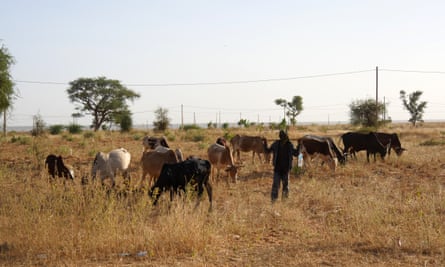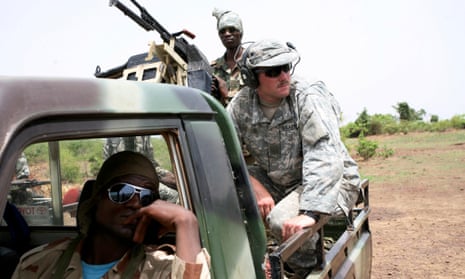New details of the attack in which four US special forces and four Nigerien soldiers were killed by militants suggest that they fought alone against a far superior force for hours – despite repeated calls for help by local villagers.
Testimony collected by the Guardian suggests that soldiers ambushed in Niger last month faced an overwhelming and coordinated attack – but one that might have been cut short if Nigerien authorities had reacted as soon as they were called.
Over the course of a week, the Guardian interviewed local politicians, military sources and residents of Tongo Tongo – the village where the attack took place last month, and found:
- Witnesses describe seeing 200 heavily armed attackers swarming towards the soldiers on motorcycles – a far greater number than previously reported.
- The soldiers fought alone for around six hours despite the village chief’s panicked calls to four separate Nigerien authorities, according to villagers.
- The bodies of the American and Nigerien soldiers were stripped of their clothes, boots and weapons, and some were left completely naked.
- Two of the American troops’ bodies were dumped in the back of one of the attackers’ vehicles, suggesting the militants intended to carry them off before they were forced to abandon them by the arrival of French helicopters.
- The body of La David Johnson, one of the American soldiers, was found at some distance from the main battlefield two days after the attack, villagers said. He had been stripped naked and had a severe wound to the head.
The ambush cast a spotlight on a remote war that many Americans did not even know their military was fighting. It also prompted an ugly dispute in Washington after Donald Trump was accused of making insensitive remarks to Johnson’s widow in a condolence call.
But US and Nigerien commanders have given conflicting accounts of the battle, and the incident has raised serious questions over how what was supposedly a routine reconnaissance mission turned into disaster.
On the day of the attack, there was a celebration in Tongo Tongo, a village of about 2,300 people who eke out a living farming millet and maize near the Malian border. A child was being baptised, and almost the whole village had turned out.

The local chief Alassane Mounkaila was presiding, when a villager approached and said that some soldiers had stopped by the village well and asked for water.
Villagers had known the military was in the area the previous evening, when they saw the lights of their convoy pass the village. They didn’t know where the soldiers had spent the night, but they knew it was somewhere further north, close to the border.
Mounkaila and Djibo Adamu, the oldest man in Tongo Tongo, went to greet the Americans and the Nigerien soldiers, who were standing around seven military vehicles and an ambulance. They were about to leave, when Mounkaila offered them a live sheep to take with them for dinner.
According to Adamu, the Nigerien soldiers said they didn’t have time to wait, but the Americans disagreed.
“They said: ‘Go ahead, get the sheep,’” said Adamu. “It was at my house. It only took me 10 minutes to get it.”
As they loaded the sheep into the back of one of the vehicles, the Americans said through the translator: “We’re looking for some terrorists. Where are they?”
The village chief gestured at the arid land all around them. “He said: ‘If you’re looking for terrorists, this area is full of them. They’re everywhere,’” Adamu recounted.
Over the past decade, jihadists with ties to Isis and al-Qaida have exploited the lack of functioning state institutions and existing ethnic tensions to establish themselves across the Sahel, a remote desert region awash with weapons from a series of interconnected conflicts.
One group active near Tongo Tongo reportedly answers to Adnan Abu Walid al-Sahraoui, a jihadist thought to hail from Western Sahara who pledged allegiance to the Islamic State in 2015.
It was this faction which is believed to have launched the 4 October attack.
The two elders were making their way back to the baptism, when suddenly they heard the roar of motorcycles.
Armed men riding two to a bike were speeding towards them from all directions. Adamu estimated that about a hundred motorcycles – about double previous estimates – swept past them and in the direction the military convoy had taken.
As the villagers sprinted for their houses, gunfire broke out, and did not let up for another six hours.
A military source who spoke to the surviving Nigerien troops said that the initial attack only lasted a few minutes.
“[The soldiers] thought it was over, the enemy had left. Nobody had been killed yet. They began to gather the injured, to organise themselves – and then the enemy came back in force. They couldn’t even raise their heads to see how many of them there were,” he said.
Kalla Moutari, Niger’s defence minister, said the soldiers were taken completely by surprise. “They were totally exposed. They had to get down and run,” he told the Guardian.
Meanwhile in Tongo Tongo, the village chief was calling everyone he could think of for help: the governor, the local prefect, and the commander of the military base in Ouallam, about an hour’s drive away.
He also called his local MP, Karimou Yacouba, whose home village is about 7km from Tongo Tongo. Yacouba said the first call came just after the attack began at about 10am.
“I could hear the gunshots over the line. He said he was hiding in his bedroom. He told me to call for help, to quickly tell the authorities,” Yacouba said.
This Yacouba duly did, but when he managed to get the chief on the phone again, at about 4pm, reinforcements had still not shown up.
“Everything that happened could have been prevented if help had arrived sooner,” Yacouba said.

The attackers only fled six hours later when French aircraft arrived, villagers said. They made off with three vehicles stolen from the soldiers, but left behind one of their own pickups, the engine running. On the truck’s bed lay the bodies of two Americans.
Four other bodies were scattered across the area; several of the fallen soldiers had apparently run for cover before being hunted down.
Initial reports of the battle suggested that three Americans had died. But two days later, in a copse some distance from the battlefield, village children found Johnson’s body wedged between two trees.
According to villagers, he had been stripped of all his clothes, though the defence minister Moutari denied this.
Since the attack, Mounkaila, the village chief, has been accused of deliberately slowing the soldiers down by giving them the sheep in order to allow the attackers to draw closer. He was arrested a few days after the attack and is being held in an anti-terrorist unit in Niamey.
The Pentagon and Niger have both announced investigations, but US investigators only reached the site of the battle on Saturday.
By contrast, the villagers said, some of the militants who killed the soldiers have ridden their motorcycles through the village many times over the past month.
According to Abou Tarka, head of Niger’s High Authority for Peacebuilding, US and Nigerien troops have been into Mali 19 times in the past 18 months – and not just on reconnaissance missions.
“They have captured, they have killed, they have done some operations in the area for the past year and a half,” he said. “This operation just turned out bad.”
